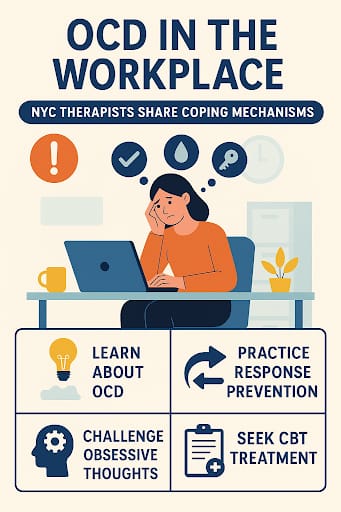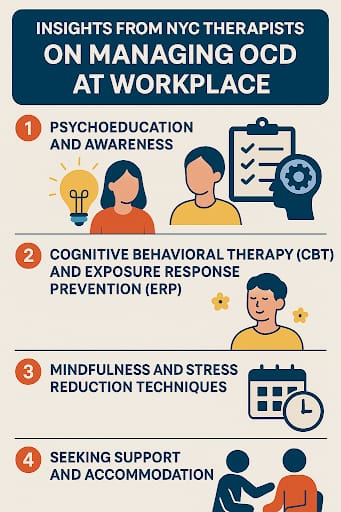
INTRODUCTION
Are you finding it challenging to be productive with obsessive thoughts or compulsive behaviours in your work environment? Living with Obsessive-Compulsive Disorder (OCD) in the workplace can be tricky, it can reduce social relationships, compromise focus, and even diminish confidence.
Working in the fast pace of New York City can magnify these particular challenges. NYC therapists specializing in OCD recognize these distinct challenges and offer coping strategies designed to help people ease their symptoms, manage their anxiety and perform successfully at work.
This blog highlights effective approaches to consider for those living with OCD in the workplace.
Understanding OCD and Its Workplace Impact
Obsessive-Compulsive Disorder (OCD) is a mental health disorder characterized by a cycle of intrusive and unwanted thoughts (obsessions) and repetitive behavior or mental rituals (compulsions) done to relieve the anxiety of the thoughts.
Some examples of obsessions may include fear of contamination, fear of harming others, and needing things to be symmetrical and exact. Common compulsions to obsessions are compulsive hand washing, repeatedly checking something, counting things, and performing specific mental rituals.
Many people stereotype OCD as related to cleanliness, symmetry, or orderliness, but OCD is very complex and varies widely person to person.
How OCD Manifests in the Workplace
Obsessive-Compulsive Disorder (OCD) in the workplace can be a barrier to performance and well-being.
- There may be compulsions, such as having to check or if seeking perfection leads to difficulty completing tasks.
- Obsessive thoughts can make it difficult to concentrate, while anxiety about uncertainty or change can lead to inconsistency in performance and overall work stress.
- Avoidance can lead to limited social interactions or the ability to complete a range of tasks.
- Oftentimes, the individual does not recognize avoidant or compulsive behavior that is being cultivated by OCD in the workplace.
- Finally, overwhelming anxiety about making a mistake or falling short of an individual standard to perform can lead to the heightened level of stress and ultimately procrastination or feeling burnt out.
These barriers/difficulties typically lead to missed deadlines, workplace conflict, and fear to take on new challenges.
The Stigma of OCD at Work
Despite a growing social awareness and increase in understanding individuals with mental health issues, Obsessive-Compulsive Disorder (OCD) often continues to be misunderstood and stigmatized in professional settings and contexts.
- An individual may worry that disclosing they have OCD to their employer would lead to them being judged, marginalized, or possibly even fired.
- The fear of discrimination can lead to silence and secrecy where symptoms and emotional distress could worsen.
- Without the opportunity for open dialogue or a supportive environment, individuals can feel isolated and overwhelmed and discouraged to seek help.
- The absence of understanding in the workplace can negatively affect performance and prevent the individual from taking reasonable accommodations that allow them to thrive with their profession and support their wellbeing.
Insight from NYC Therapists on Managing OCD at Workplace

1. Psychoeducation and Awareness
Recognizing the exact impact of OCD on work performance is an important step towards effective management for a worker with OCD.
- Many therapists highlight the role of psychoeducation in treatment for OCD, as it is helpful for individuals to understand the nature of their OCD, and how obsessions are separate from compulsions.
- This insight sheds light on the employees’ symptoms in the workplace (e.g., checking, reassurance-seeking, perfectionism), and helps the employee identify specific situations or tasks that disrupt their focus and productivity.
- The more the individual will be conscious of this pattern, the more likely they will be able to separate OCD-driven behavior from regular work behavior and take steps towards better, healthier, and more effective coping.
2. Cognitive Behavioral Therapy (CBT) and Exposure Response Prevention (ERP)
Cognitive Behavioral Therapy (CBT), particularly Exposure and Response Prevention (ERP), is considered the gold standard treatment for OCD.
- The procedures of ERP involve facing anxiety-provoking situations and resisting the compulsion to perform the compulsive act.
- In a workplace context, therapists and clients can identify the specific work obsessions (for example, checking or perfectionism) and develop ERP scenarios that can be undertaken in the client’s job context.
- As people engage in the ERP exercise, their anxiety and power that the compulsive behavior is occupying decrements.
3. Mindfulness and Stress Reduction Techniques
OCD therapists in NYC frequently emphasize mindfulness and stress reduction practices for coping with OCD symptoms at work.
- Mindfulness allows the person to notice intrusive thoughts in an open-minded and non-judgmental way, and to learn to sit with any discomfort.
- Mindfulness also increases awareness and can help individuals lessen reactivity and compulsivity.
- There are very simple techniques and practices, such as slow and deep breathing, taking short mindfully breaks, and taking grounding breaks on the job, can help employees remain focused and mindful.
- By applying mindfulness practices, one develops a better tolerance for anxiety and can also reduce the frequency and severity of OCD-related work responses.
4. Building Workplace Routine and Boundaries
Creating predictable workplace routines and clear boundaries can be remarkably beneficial for people with OCD symptom management.
- There is value in introducing simple daily habits, such as creating prioritized to-do lists each morning, pre-arranging email check-ins at specific times, and scheduling updates in clearly marked time slots can help maintain focus and reduce anxiety.
- Additionally, establishing firm boundaries regarding work hours – e.g. not doing work-related tasks after hours and not re-checking work once the workday is complete—can help minimize compulsive work-related behaviors that bleed into personal time; thereby decreasing general stress and work-life balance.
5. Seeking Support and Accommodation
Utilizing support and requesting reasonable accommodations in the workplace can play a vital role in managing OCD effectively.
- OCD Therapists in NYC often recommend talking to a supervisor or HR professional to explore potential support and accommodations, especially if OCD symptoms are starting to impact work performance.
- OCD may be considered a disability under the Americans with Disabilities Act (ADA), and therefore it would be possible to request reasonable workplace accommodations.
- These accommodations may include flexibility in responding to deadlines, access to quieter workspaces, scheduled breaks to engage in coping strategies, and options to work remotely.
- The productivity gained from these adjustments can often far outweigh any stress created by managing the demands of OCD at work.
This may harm people with OCD (Reword)
Practical Tips to Manage OCD Symptoms at Workplace
OCD symptoms at work typically present with actionable, day-to-day approaches and ways to support emotional regulation and productivity levels.
- OCD therapists in NYC recommend creating a “safe space” on your desk with items that provide comfort such as stress balls or fidget toys to help repurpose any anxious energy.
- By having a ritual of sorts on every break, involving practicing progressive muscle relaxation, you could relieve the tension stored in your physical body.
- Visual clues, such as affirmations or calming statements, throughout the day can also provide reassurance.
- Limiting caffeine and sugar can help as well to lessen anxiety levels.
- Planning the most challenging tasks or meetings for times that are the least severe with your symptoms, can help you manage your responsibilities.
- Creating a support system – support network – of trusted colleagues, friends, or mental health professionals can enhance resiliency and stability.
Final Thought
Managing OCD in the workplace is all about understanding how OCD impacts an individual, having patience, and developing practical strategies based on the needs of the individual.
- Therapists treating individuals with OCD in NYC have emphasized that with psychoeducation, therapy CBT, ERP, mindful practices and workplace practices people working with OCD will have the techniques to respond to challenges in the workplace.
- Additional support and workplace accommodations broaden the empowerment support systems that are available to help employees with OCD contribute positively to their workplace, while also managing their OCD symptoms.
Proactively managing OCD in the workplace using resilient coping strategies can help employees with OCD to stay focused, reduce anxiety, and enhance their productivity and creativity.
Reference
- The impact of OCD | OCD-UK. (n.d.). https://www.ocduk.org/ocd/impact-of-ocd/
- Sabolova, M. (2024, October 29). Understanding OCD in the workplace: How OK Talk can help – OK Talk. OK Talk Counselling. https://oktalk.co.uk/understanding-ocd-in-the-workplace-how-ok-talk-can-help/
- Obsessive-Compulsive Disorder (OCD). (2025, June 2). Cleveland Clinic. https://my.clevelandclinic.org/health/diseases/9490-ocd-obsessive-compulsive-disorder
- Reid, J. E., Laws, K. R., Drummond, L., Vismara, M., Grancini, B., Mpavaenda, D., & Fineberg, N. A. (2021). Cognitive behavioural therapy with exposure and response prevention in the treatment of obsessive-compulsive disorder: A systematic review and meta-analysis of randomised controlled trials. Comprehensive Psychiatry, 106, 152223. https://doi.org/10.1016/j.comppsych.2021.152223
- Chien, W. T., Tse, M., Chan, H. Y., Cheng, H. Y., & Chen, L. (2021). Is mindfulness-based intervention an effective treatment for people with obsessive-compulsive disorder? A systematic review and meta-analysis. Journal of Obsessive-Compulsive and Related Disorders, 32, 100712. https://doi.org/10.1016/j.jocrd.2022.100712
- Coping with OCD at work | Workplace wellness.” Bupa UK, 11 January 2024, https://www.bupa.co.uk/business/news-and-information/ocd-at-work






